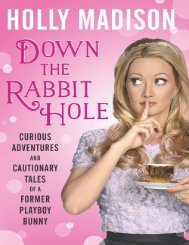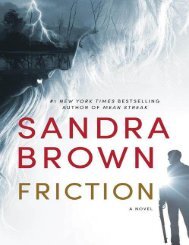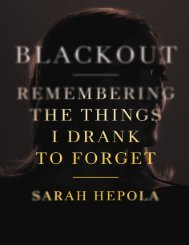Blackout_ Remembering the Things I Drank to Forget
Create successful ePaper yourself
Turn your PDF publications into a flip-book with our unique Google optimized e-Paper software.
<strong>the</strong> scorn of strangers. They skip through a grassy meadow where every picture <strong>the</strong>y paint is<br />
important, every s<strong>to</strong>ry worth telling, whereas <strong>to</strong>day’s online writer traverses an enemy terri<strong>to</strong>ry<br />
where any random dude with a Tumblr account can take you down.<br />
Perhaps I was using alcohol not <strong>to</strong> spark my creativity but <strong>to</strong> blunt my sensitivity. I needed<br />
someone <strong>to</strong> hold my hand.<br />
After I quit drinking, I didn’t write for six months. I was <strong>to</strong>o fragile. I spent that time editing<br />
personal essays for Salon. I loved reading s<strong>to</strong>ries of o<strong>the</strong>r people’s lives, extraordinary things<br />
happening <strong>to</strong> ordinary people. One woman met her dream guy only <strong>to</strong> watch him die of an aneurysm<br />
that very day. One woman was trapped under <strong>the</strong> rubble after <strong>the</strong> earthquake in Haiti. She was saved,<br />
but <strong>the</strong> o<strong>the</strong>r woman in <strong>the</strong> house wasn’t. It was mind-blowing what could unfold in <strong>the</strong> course of a<br />
life.<br />
The s<strong>to</strong>ries got me out of myself, but <strong>the</strong>y also s<strong>to</strong>ked my writer’s envy, which isn’t necessarily<br />
bad. Envy can be an arrow that points <strong>to</strong> <strong>the</strong> things you want. The more I read those s<strong>to</strong>ries, <strong>the</strong> more I<br />
thought: I could do that. That might feel good. I should join <strong>the</strong>m.<br />
The first thing I wrote in sobriety was an essay about quitting drinking. It felt like insurance for a<br />
person prone <strong>to</strong> relapse. I wanted <strong>to</strong> be on record. I wanted <strong>to</strong> double down on public humiliation <strong>to</strong><br />
keep me from backsliding. The s<strong>to</strong>ry wasn’t easy <strong>to</strong> write, but it wasn’t that hard, ei<strong>the</strong>r. When I was<br />
done, it sounded like me. The me I remembered.<br />
After <strong>the</strong> piece published, writers I admired responded with kind words and strangers in <strong>the</strong><br />
comments responded with a warm stream of urine down my leg. But I was starting <strong>to</strong> realize this<br />
online anger wasn’t about me. It was a by-product of garden-variety powerlessness. Usually when I<br />
reached out <strong>to</strong> one of those people, <strong>the</strong>y would say similar things. Oh, I didn’t think anyone was<br />
listening—which suggests <strong>the</strong> true source of <strong>the</strong>ir rage.<br />
I kept writing. I began waking up at 6:30 and writing for <strong>the</strong> first four hours. No procrastinating.<br />
No rearranging <strong>the</strong> furniture. Just wake up and stare down. The work was never easy, but it became<br />
easier. Less like a geyser I kept waiting <strong>to</strong> blow and more like a faucet I could turn on and off.<br />
We ascribe such mystery and magic <strong>to</strong> <strong>the</strong> creative process, but its essence is quite basic. Moving<br />
a pile of bricks from one side of <strong>the</strong> room <strong>to</strong> <strong>the</strong> o<strong>the</strong>r requires strength. Time, discipline, patience.<br />
Writers write. That’s what we do.<br />
“The idea that creative endeavor and mind-altering substances are entwined is one of <strong>the</strong> great<br />
pop-intellectual myths of our time,” Stephen King wrote in his memoir and instruction manual about<br />
creativity, On Writing. King is one of <strong>the</strong> many heroes I’ve had who turned out <strong>to</strong> be an addict. He<br />
was a serious beer binger, who admits he could barely remember writing his novel Cujo.<br />
When I read <strong>the</strong> s<strong>to</strong>ries I wrote during my heaviest drinking years, I don’t think <strong>the</strong>y’re bad. I am a<br />
little appalled, though, at how frequently alcohol intrudes. Interviews take place in bars. Entire<br />
narratives revolve around drinking. Jokey asides are made about hangovers and blackouts. A beer or<br />
a glass of wine sits in <strong>the</strong> corner of nearly every piece, like some kind of creepy product placement.<br />
A friend of mine is a music teacher, who says pot helped him truly hear music for <strong>the</strong> first time.<br />
“But if you smoke <strong>to</strong>o much pot,” he said, “you get that Jamaican high. Everything turns <strong>to</strong> reggae.”<br />
Whatever creative growth alcohol and drugs might offer at first, it doesn’t last. You s<strong>to</strong>p learning and<br />
noticing.<br />
“Try <strong>to</strong> be one of <strong>the</strong> people on whom nothing is lost,” Henry James wrote. I first heard <strong>the</strong> quote<br />
in an interview with Pete Hamill, author of <strong>the</strong> 1994 memoir A Drinking Life. As an old-school





